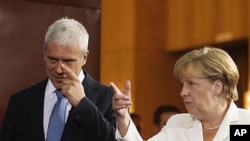German Chancellor Angela Merkel is in Serbia for a visit before a European Commission decision later this year on whether Serbia can become an official candidate to join the European Union. The visit is the first by a German head of state since 2003 and many in Belgrade hope it is indicative of how far this troubled nation has come in its efforts to integrate into the European heartland.
The welcome of the European leader comes at a time of hope for this Balkan nation, that after nearly a decade of waiting to join the European Union, the goal is in reach.
But rather than being a celebration of the many reforms Serbia has implemented, Tuesday’s visit by German Chancellor Angela Merkel was overshadowed by political tensions.
Late last month, problematic relations between Serbia and Kosovo took a sour turn, creating problems that could complicate Serbia’s EU bid.
She said, we see Serbia’s future as inside the European Union, but there are still quite some obstacles in the way.
The European Commission will meet in October to consider whether to grant Serbia candidacy status for EU membership.
The government has implemented reforms in its economic sector and joined regional trade agreements. It bolstered human-rights laws and passed electoral reforms intended to ensure members of parliament are accountable to their constituents.
Serbia also entered into dialogue with Kosovo, whose secession and declaration of independence from Belgrade in 2008 rips at the heart of Serbian nationalism.
Most significantly, Merkel congratulated Serbia for recently arresting two key war-crimes suspects, Ratko Mladic and Goran Hadzic and transferring them to the Hague. That appeared to remove a significant hurdle for European candidacy.
But last month, just days after Hadzic was arrested, bilateral negotiations with Kosovo collapsed when the capital Pristina, demanded a Kosovo customs stamp at its border crossings with Serbia. Belgrade saw this as trying to force it to recognize Kosovo’s independence.
When the talks stalled, Pristina moved its own police to two administrative border crossings between Serbia and Northern Kosovo, a lawless region where ethnic Serbs feel unprotected and organized crime holds sway. Rioters burned down one border post, and international peacekeepers had to step in while Belgrade negotiated with Pristina to regain calm.
Serbian officials say the escalation was an attempt to derail its E.U. efforts and have made clear that if forced to choose, recognition of Kosovo is a line it will not cross, even for entry into the E.U.
"Serbia wants solutions. Serbia does not want to perpetuate the conflict," said Serb President Boris Tadic. "We want a normal life for not only Serbians, but for Albanians as well. But at the same time, we want to preserve our integrity just like any other normal country."
Chancellor Merkel urged Belgrade to resume normalization talks with Pristina. A peaceful life in the European Union will not be possible, she said, without all western Balkan countries being E.U. member states.
Serb President Boris Tadic said he plans to do that. But he also called for the European Union to openly condemn Pristina’s actions last month.
"We expect from the EU to a take a clear stand on Pristina, he said, and to make clear to the Albanian leadership in Pristina, that for us it is absolutely unacceptable to reward unilateral acts or acts of violence and with the new realities they create on the ground. Serbia stays committed to peaceful solutions we want to continue a dialog about Kosovo," added Tadic.
As Serbia moves forward, it faces many more hurdles and its people are already growing weary of the long, bumpy road to Europe.
A recent government poll found the number of Serbs supporting EU candidacy has dropped significantly, even while support for the reforms being implemented in the process grew to more than 70 percent.
Belgrade Fund for Political Excellence founder Sonja Liht sees this as a sign of a maturing nation, but one that is increasingly disillusioned.
"There is also a feeling sometimes here that Serbia cannot win and that if one condition has been fulfilled, a new condition will emerge," said Liht.
Talks with Kosovo are expected to resume in September, just a few weeks before the European Commission recommendation on Serbia.
Serbia Welcomes Merkel on Threshold of EU Bid
- By Dianna Cahn




